“I wasn’t in a great spot,” Jones admits of his reaction to the news. “It is going to take time to process,” adds endurance rider Annette Edmondson.
The squad had been on the coronavirus rollercoaster since the world championships; the team travelled to Berlin wearing face masks, handshakes were banned and a Danish competitor was quarantined due to possible exposure at a previous race. Not long after the Australians returned home, a staff member was hospitalised by the virus. Every day brought greater uncertainty.
“I really struggled with the rapid developments, especially in the week before the postponement,” says sprinter Kaarle McCulloch. “We just did not know what would happen.”
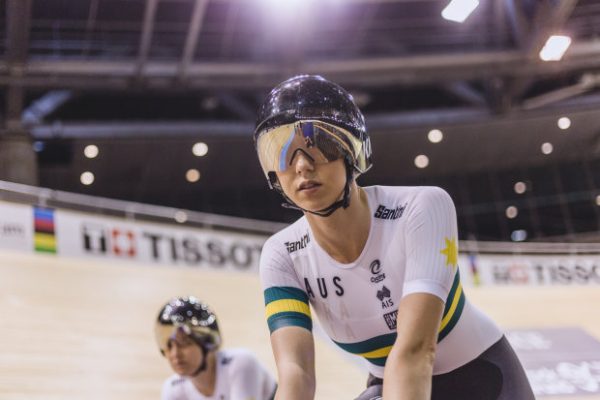
Emerging endurance star Maeve Plouffe. Fellusch
After a brief post-championships break, McCulloch had flown to Cycling Australia’s hub in Adelaide in mid‑March. “I thought we had 20 weeks to go before the Olympics,” she continues. “Literally, the next day the velodrome shut down and I was driving back to NSW with all of my stuff, because South Australia was closing its borders.”
Jones and his staff worked swiftly to support the athletes. “Our first point of call was to manage that impact,” says Jones. “That’s not a quick thing – people will go through all sorts of thoughts and feelings in the next day, week, month. We don’t need to make decisions in the short-term.”
Performance psychologist Ruth Anderson had an essential role. “The biggest challenge for everyone is how we tolerate the anxiety created by uncertainty,” she says. “There are a lot of questions that just can’t be answered right now.”
I was looking at Tokyo being possibly my last event. Now I have an added year of work to do.
— Kaarle McCulloch
For Anderson, coronavirus and the delayed Olympics have proven to be a unique professional challenge. “We are trying to provide services across a broad range of athletes, but remaining strategic in what we are doing,” she says. “We are not just trying to make people feel better; we’re trying to equip athletes with the information and skills that they need for right now, while being mindful of the longer term.
“The challenge is making sure we are doing the right thing at the right time in a co-ordinated approach, especially when we’re not face to face.”
For older athletes, the 12-month postponement has taken an additional toll. “I was looking at Tokyo being possibly my last event,” says 32-year-old McCulloch. “I wanted to have an extended break and then decide if I wanted to continue on. Now I have an added year of work to do.”
Her colleague Edmondson, 28, is in a similar position. “You have to reassess where you’re at in life,” says the three-time world champion. Both riders insist that they will be at the Olympic velodrome come mid-2021. With the pandemic still raging across the globe, however, no one knows how their preparations will be affected.
“Whatever this next year looks like from a training and competition perspective, it will be different from what we have had in the past,” performance psychologist Anderson says. “But different isn’t necessarily good or bad – it can just be different.”
In recent decades, track and road cycling have been critical to Australian Olympic success: between 1992 and 2012, Australian cyclists claimed nine gold, 11 silver and 13 bronze medals. In turn, the sport’s funding is dependent on these podium appearances.
But after a sustained period of Australian Olympic dominance, both in cycling and across the board, performance began to dip at the London 2012 Olympics. Four years later, Australia’s riders travelled to Rio de Janeiro with high expectations; the Australian Olympic Committee (AOC) predicted three gold medals on the track alone. Success on the bike was tipped to lead Australia back up the overall standings.
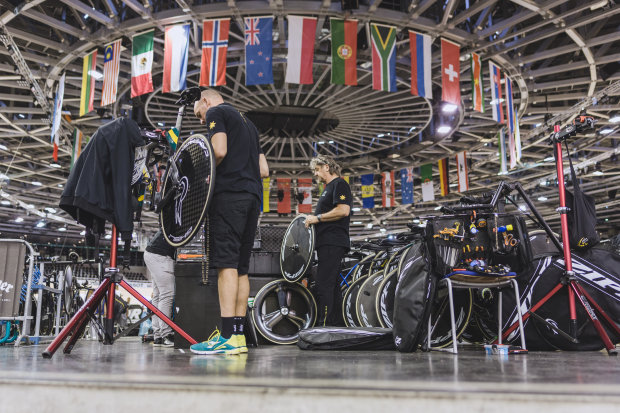
Mechanics prepare bikes in the Berlin Velodrom. Fellusch
The team failed to deliver. A mix of misfortune, injuries and stasis saw them depart Brazil with one silver and one bronze. “It was hard to handle coming home, because we went off with such high ambitions,” says Edmondson. “You don’t plan for failure.”
Endurance coach Tim Decker saw his female riders crash during a warm-up, and his male riders break the pre-Olympic team pursuit world record – only for Great Britain to twice better it. “Rio was devastating, for coaches and athletes,” he recalls. “For all of that hard work to unravel is pretty challenging.”
After much soul-searching, Cycling Australia headhunted Jones from UCI World Tour road cycling outfit Team Sky in early 2017. His brief: return Australia to the sport’s pinnacle in time for the Tokyo Olympics. A former employee of British Cycling, Australia’s primary rival on the track, the hire had a hint of “if you can’t beat them, join them”.
Change came rapidly. Within months, Jones earned himself the unflattering nickname “Hurricane”. Coaches, staff and riders were axed; priorities and programs were reshaped. “We haven’t changed what we’re trying to achieve, but we have changed the way we achieve it,” says Decker, who retained his place. But Jones has his critics – long-time coach Gary Sutton, whose contract was not renewed, described the way he was treated as “one of the most unprofessional things I have seen done in 25 years” (Sutton is now with Team USA).
“There was resistance,” McCulloch says. “Change is hard, change is confrontational. But the definition of insanity is repeating the same thing over and over and expecting different results. Simon was the change we needed.”
The reforms were divisive, but they have been effective – to date. On the road, the Australians have won seven world championships medals in the past three years, including two world titles. On the track, the Australians dominated the Commonwealth Games and won six gold medals at the 2019 world championships. “This is my fourth Olympic cycle,” says McCulloch. “I have seen three different approaches, and I feel – as a program – this is the best we’ve been.”
Jones had his first taste of cycling as a 10-year-old, watching televised highlights of the Tour de France at his home in Bristol, England. “I was just totally awed,” he recalls. His father bought him a bike and Jones was soon racing at amateur level, even spending a season in France as a teenager. “I knew I wasn’t good enough but I wanted to try,” he says. “I lived in a farmhouse, learnt French and raced.”
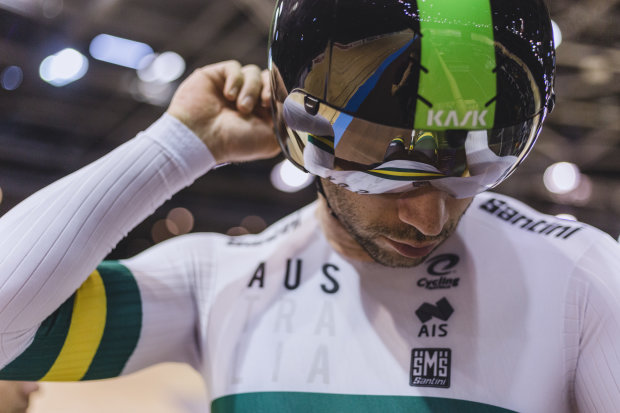
Sprinter Nathan Hart. Fellusch
He returned to England, studied human movement and quickly found himself at British Cycling. “I was in the right place at the right time,” Jones admits. Now 50, he has been involved in the sport ever since. Along the way Jones began a doctorate (“about cycling performance, but I became bogged down in mechanical engineering”), and on several occasions tried to leave cycling. It kept bringing him back. “It is better than a real job,” he quips.
Jones comes across as slightly eccentric, charismatic (when he wants to be), and intensely driven. “I find it hard to switch off,” he concedes, before scrolling through his iPhone to locate a meme sent by his wife: “You aren’t even listening”, it reads. His two teenage daughters keep him “honest”, and he suspects that they are “quietly proud” of their father, even if cycling “is not their favourite sport.”
The Bristolian was with British Cycling at a pivotal time, when the likes of Peter Keen and Sir David Brailsford pioneered a philosophy of “marginal gains” that would elevate Great Britain, and later Team Sky, to the top of international cycling. “That was an excellent working environment,” remembers Jones. “Dave is so driven. He never stops wanting to win.” Within a decade, Great Britain was the dominant cycling nation; Team Sky (now Ineos) has won the Tour de France seven times. “They did the basics really, really well, and put riders at the centre of their plans,” he continues.
It is an approach that Jones has sought to transplant to Australian cycling. “That remains a work in progress,” he admits. “You can’t solve everything all at once, but you can always listen and be open to feedback.” While Jones is careful not to criticise his predecessors, he does say the turnaround task has equated to “transforming a sports club into a professional team.”
The intensity of preparing for the Olympics was on display in February – a month before the postponement news broke – at the UCI Track World Championships in Berlin. After five days of racing, there’s a sense of fatigued elation coming from the athletes in their various team pits in the centre of the velodrome. Records have tumbled, old favourites have defended their titles and new champions have been crowned.
Not so much in Australia’s pit, where the feeling is less buoyant. The team sits in 11th place, behind Belarus. For the first time since 2008, the Australian Cycling Team risks not securing a single world title.
Riders typically avoid the pits when not competing, but almost all of Australia’s delegation are gathering in casual clothes to cheer on teammate Stephanie Morton. Welsford lies prone on the floor, in agony following a tough penultimate race (the 200-lap Madison).
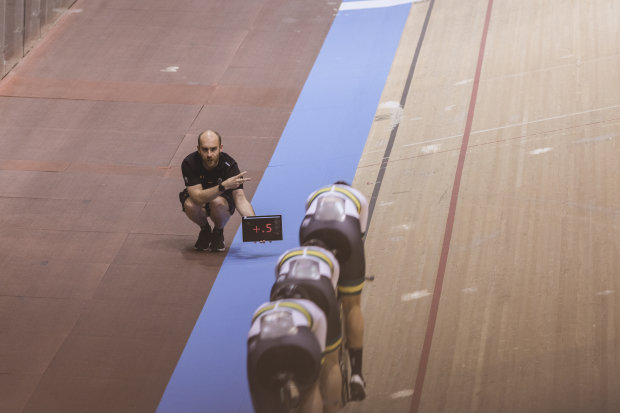
Coach Jason Bartram guides his squad through their splits. Fellusch
As Morton warms up for her final, Jones observes with a vacant expression. “We have come up short,” he admits. After three years of smooth sailing under Jones, including almost a dozen world titles on the track and multiple road medals, the Australians have faltered in the lead-up to what would have been – before the postponement – their most consequential test. “I guess the first couple of years were too easy,” he deadpans.
Morton’s race begins and the Australians watch on with nervous anticipation. As she begins the last lap, her normally mild-mannered colleague McCulloch emits a guttural scream of support. Morton ultimately claims bronze, Australia’s third medal of the meet. “It is slowly starting to come together,” she says.
In Jones’ mind, the gears are whirring. “We will debrief on Monday, come up with a plan, leave out some things we are doing now and start doing some things that we weren’t doing,” he explains.
Will that be enough? “I am optimistic,” says Jones.
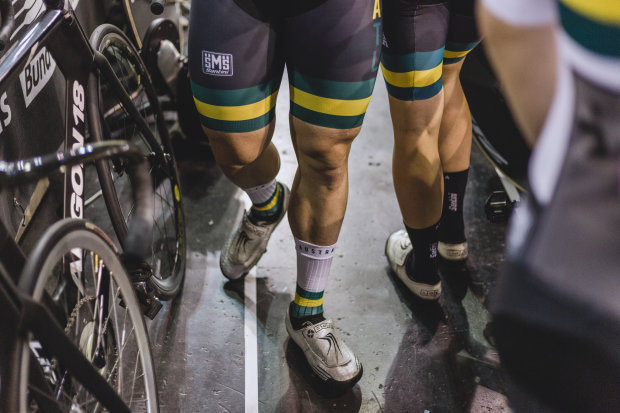
Cycling legs. Fellusch
Jones’ philosophy has three core components. The first is a ruthless rationality. “We have to think logically,” he says. “We can’t let our decision-making become clouded by emotion. If medals are our ROI, what’s our investment methodology?”
Jones caused controversy when he only selected five out of a possible seven riders for the women’s road team in 2017 (two omitted riders successfully appealed), and he has threatened not to contest certain track disciplines in Tokyo. “We assess gold medal priorities and work backwards from there,” he continues. “We have a limited amount to spend and, like with any investment, need to decide how best to spend it. We are a profession – we need to be professional.”
Cycling was given $10.3 million for high performance by government agency Sport Australia this financial year, of which about $7 million found its way to Jones for use across road, track, BMX and mountain bike (for able-bodied and para-athletes).
Out of adversity and disruption comes opportunity – for those who are brave and courageous enough.
— Simon Jones, performance director
Funding levels have remained largely stable in recent years despite the poor performance in Rio – cycling is the second-best supported sport, behind swimming. But Jones is critical of the way his funds are delivered. “We are funded on an annual or biannual basis, and by initiatives and projects,” he says. “Short-term funding produces a short-term mindset. We need to think long term.”
The second component of his philosophy is an almost obsessive attention to detail. Jones has a mantra: “it is not the plan, it’s the planning.” Rik Fulcher, a two-decade veteran of Cycling Australia, admits the program has become “a lot more planned, a lot more resilient and a lot more focused on the ‘what ifs’”.
During competitions, Jones frets about athlete laundry; “it might seem tiny, but it really matters,” he says. The Australians booked a hotel near the Olympic velodrome 18 months ago, to secure the best location (and rebooked it for 2021). Jones spent $8000 to rent the Fuji Speedway for an hour, for his riders to train – the racetrack will form part of the Olympic road-race course.
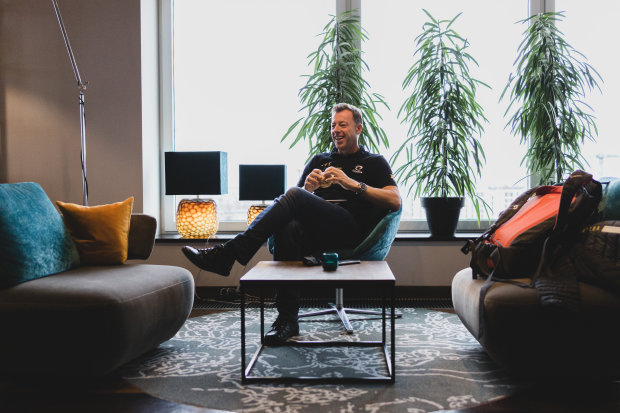
Performance director Simon Jones at the team’s hotel in Berlin. Fellusch
Finally, Jones has put athletes at the centre of his plan, and poached psychologist Anderson from British Cycling to ensure his team’s mental performance is as optimised as their physical output. “The biggest change is that the riders are now involved in decision-making,” says McCulloch. “Pre-Rio I had no idea what our strategy was, but now I have a clear direction and focus.”
By prioritising performance psychology, Jones may have given his riders the edge ahead of the coronavirus-impacted Tokyo Olympics. “All the work we have done over the past two years around mindset is a big advantage,” says Anderson. “If we hadn’t done that foundational work, if performance psychology wasn’t one of our highest priorities, then we would be in a very different situation right now – it would be extremely stressful.”
Anderson, who was chief psychologist for the AOC at two Olympics, believes athlete mentality will be critical in 2021. “When we get to Tokyo, the athletes who perform well will be those who have maximised their ability during this time and been strategic in what they have worked on and when,” she says.
“The victors will be those athletes that, despite the adversity and despite the rapidly changing circumstances, have been able to maintain their optimal psychological state.”
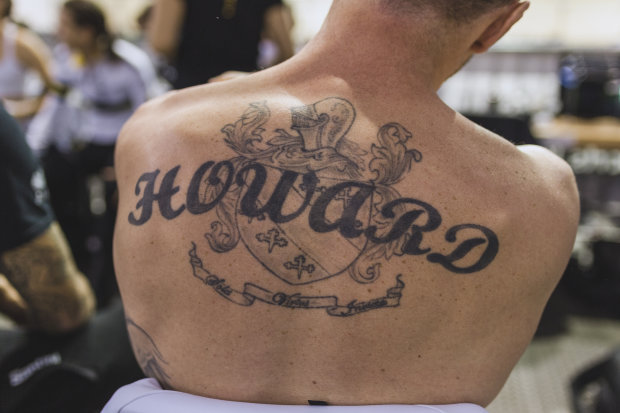
Team veteran Leigh Howard shows off his ink. Fellusch
Jones remains positive. “I can see this being a great opportunity for us,” he says. “Out of adversity and disruption comes opportunity – for those who are brave and courageous enough. We were planning to have a fallow year in 2021, a period of slowing down, reflecting, learning, growing. We’ll just bring that forward.”
His attitude resonates with the riders. “It’s only a problem if you make it a problem,” offers McCulloch. “This is an opportunity for us to walk away for a little bit, take a deep breath and then come back when the time is right and prepare full gas for Tokyo.”
If Australian cycling succeeds at the Olympics next year, a single rider – or a small squad in the case of team disciplines – will enjoy the limelight of the podium.
After receiving their medal, they will boisterously sing the national anthem and clench their fists in triumph. But the glory is not theirs alone. Behind each athlete is a team of coaches and support staff doing everything they can to ensure that Australia’s riders are in the best possible position to claim gold.
“I am busiest in the period leading up to a competition, with medical screenings, blood tests and injury management. Hopefully by competition time, things are quiet – which means I have done my job. At which
point I become an overall overseer of athlete wellbeing – are they looking after themselves, getting enough sleep, practising good hygiene?”
Mark Fisher, team doctor
“Once we are at the competition, my focus is to get the riders’ heads in the right place, and ensure they get a good pre-race hit-out. If the substantive work is not done by now, it’s too late. There is nowhere to hide.”
Tim Decker, head endurance coach
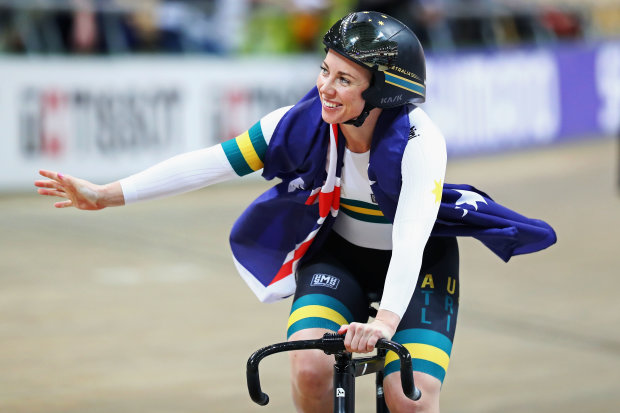
Kaarle McCulloch. Getty
“I think in the past I have forgotten how much I enjoy riding my bike. I am doing what I love – that makes me pretty lucky.”
Kaarle McCulloch, sprinter – Olympic bronze medallist, four times world champion
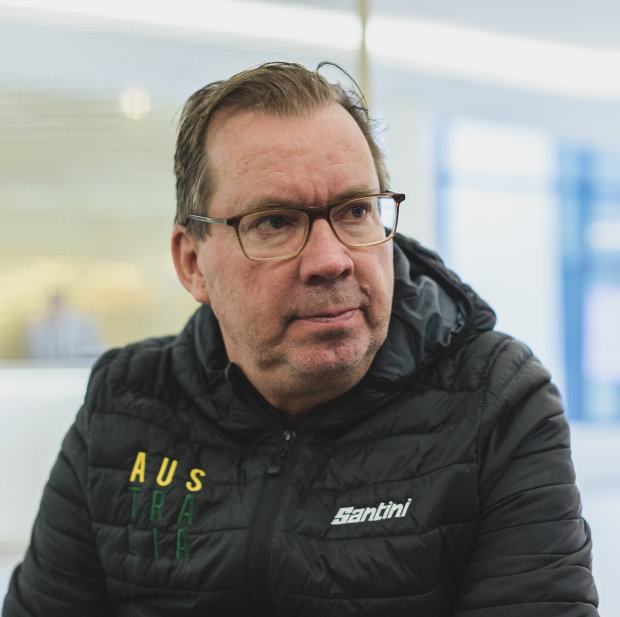
Rik Fulcher. Fellusch
“I manage all aspects of team operations. For staff, days at a normal competition are 8am to 11pm, but at the Olympics we are even more stretched.”
Rik Fulcher, team manager
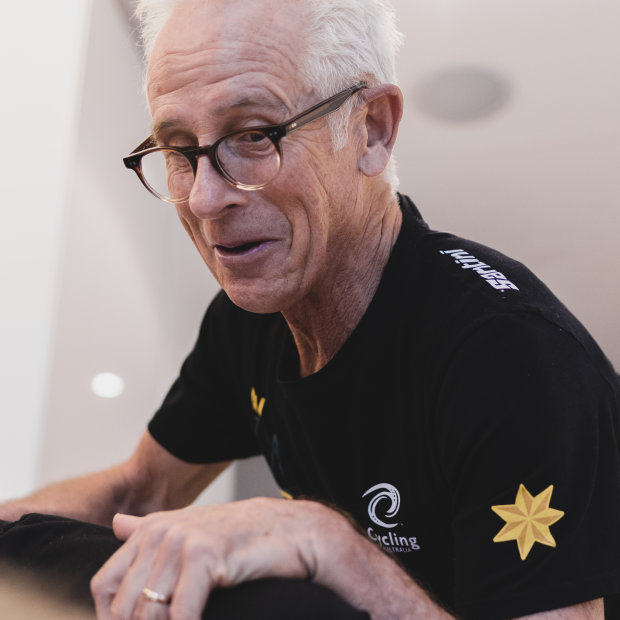
Patrick Custance. Fesllusch
“After the riders arrive, we are doing a lot of stretching, massage, soft-tissue work, a bit of treatment. Then we ease up – the riders often just want a light
massage the day before their race. During competition we help with pre-race stretches, icing and recovery.”
Patrick Custance, physiotherapist
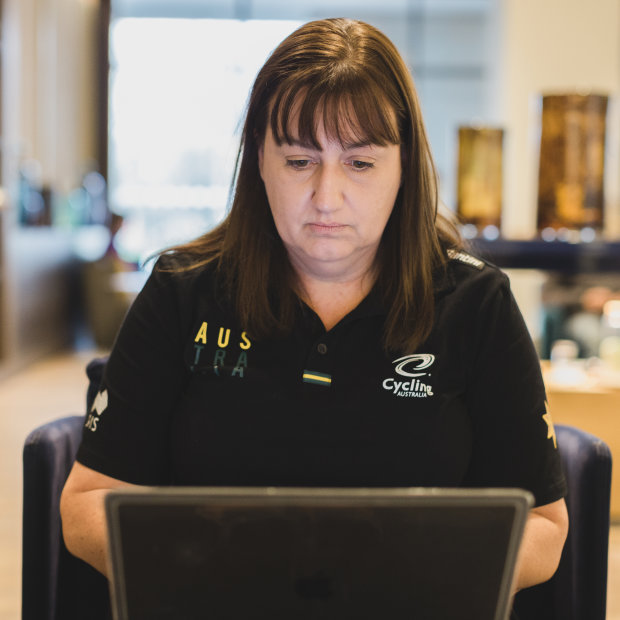
Ruth Anderson. Fellusch
“Our key aim is to equip athletes with the psychological skills for peak performance, both on the bike and in life. So that includes developing the optimal mental state to compete on the track, and general health and wellbeing off the track.”
Ruth Anderson, psychologist
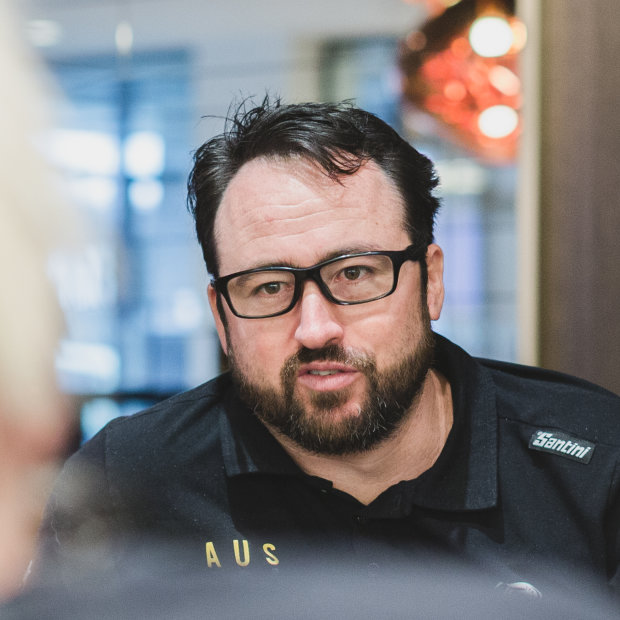
Nick Flyger. Fellusch
“We have to be honest with the riders. I recently spoke to an athlete who had been going through a tough patch, but they just had a really good session.
My advice was not to let the barometer swing from really low to a complete high. Let’s find the middle ground.”
Nick Flyger, head sprint coach
“I look after everything nutrition related: day-to-day, during training, while we are away at hotels and in competition. The riders need to be well fuelled.”
Jill Leckey, nutritionist
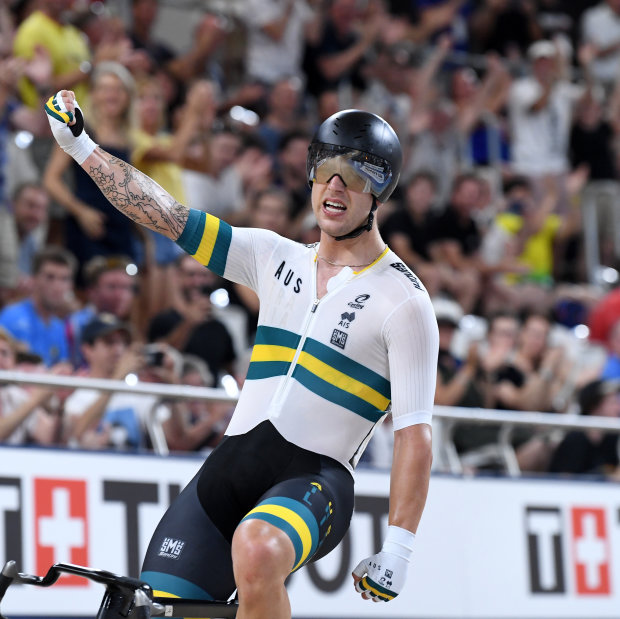
Sam Welsford. Getty
“We knew after Rio that we had a lot of work to do. We had to start from scratch. We needed to get our technology and science back to a world-class level.”
Sam Welsford, endurance rider – Olympic silver medallist, four times world champion
The May issue of AFR Magazine is out on Friday, May 1 inside The Australian Financial Review. Follow AFR Mag on Twitter and Instagram.
